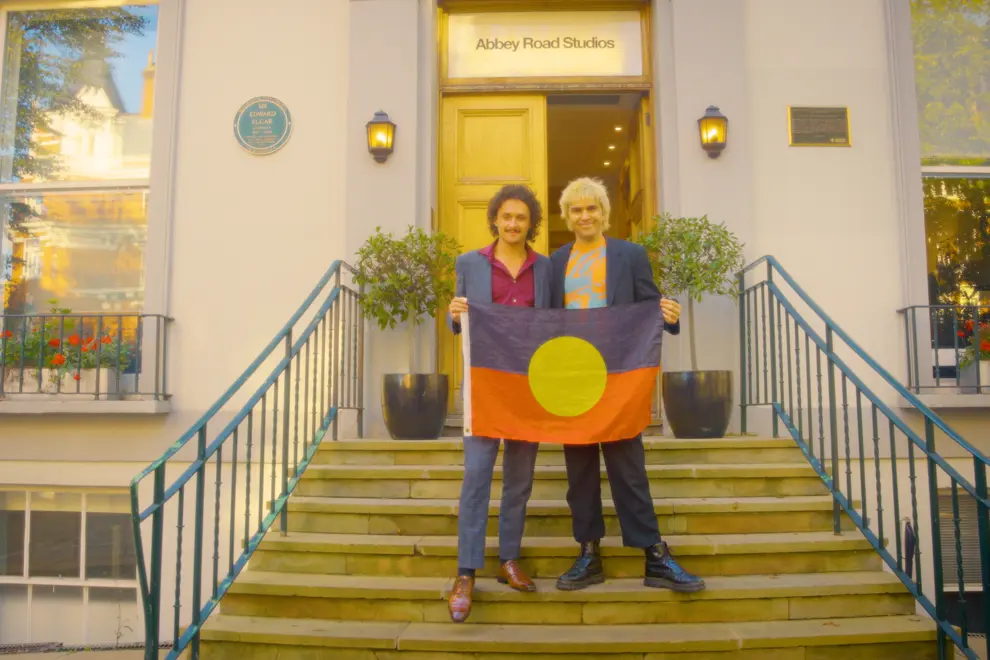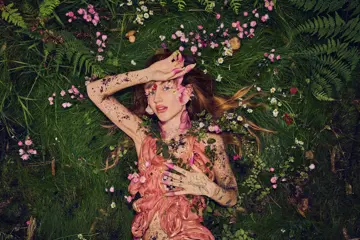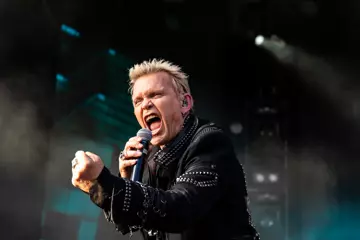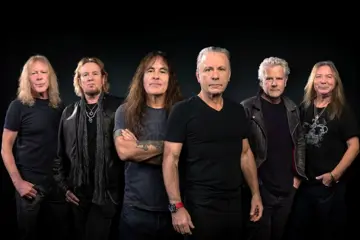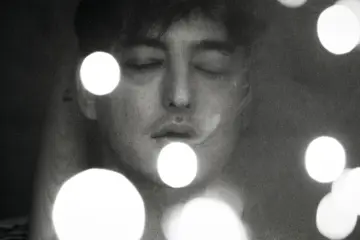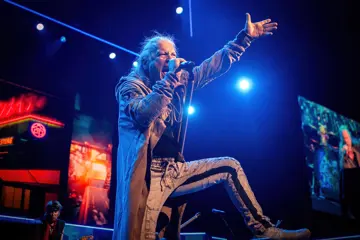“We really set out to challenge ourselves,” says Loki Liddle, the frontperson for Gold Coast (Yugambeh/Kombumerri) alt-rock sextet Selve. Liddle is talking about Selve’s second album, Breaking Into Heaven, which arrives two years after their first, Red Desert Dream.
For some bands, challenging themselves might mean recording live in the studio or writing everything together in one room. It might mean weaving in synths and electronic programming for the first time. Or it might just mean getting a blue rinse and buying some baggy trousers.
But Selve had bigger ideas. “We wanted to really convey the entire spectrum of human emotion for this album,” Liddle says.
Liddle, a Jabirr Jabirr man, is Selve’s lead vocalist, rhythm guitarist and manager. He’s one of two Indigenous members of the band, the other being lead guitarist and Anaiwan man Reece Bowden.
The album title, Breaking Into Heaven, is a mission statement. Liddle, Bowden and the rest of Selve wanted to insert themselves, and their people, into rock’n’roll mythology. But it’s also a declaration of achievement.
Don't miss a beat with our FREE daily newsletter
The album was recorded at London’s Abbey Road Studios, the first Indigenous record made at the fabled recording complex that has produced rock and pop classics such as Pink Floyd’s The Dark Side Of The Moon, Lady Gaga’s Born This Way, and Abbey Road by The Beatles.
The illustrious recording location marked the completion of a three-stage residency series that Liddle created and managed, with funding from Creative Australia and Arts Queensland’s First Nations Commissioning Fund. Liddle didn’t want to sit around waiting for permission to live out his dreams. He wanted to be proactive about making them a reality.
“I was like, what can I do myself?” he says. “You know, as a sovereign First Nations musician, what can I make happen myself? What pathways can I carve for myself?”
Liddle started thinking about the ideal recording process. He knew that he wanted to have ample time to make a record that matched the band’s ambitions, and that he wanted to bring it to life in various locations around the world. The first stage of the residency series took place on Jabirr Jabirr Country just north of Broome.
“Myself and Reece, who are the two Blackfellas in the band, we went there and spent two weeks with my Elders, Aunty Pat Torres and Uncle Wayne Barker,” Liddle says. “We just spent time on Country writing music and yarning with them.”
The objective for the first stage was to conceive a general framework for the album, while absorbing the lessons of Liddle’s Jabirr Jabirr Elders and centring themselves on Country. “I like to build worlds,” says Liddle. “So I went there to get those first embers, which I think we did really successfully.”
Stage two of the residency series took all six members of Selve to France. Simon Benesch, the producer of Red Desert Dream, is a Parisian, and he connected Selve with the folks at Midnight Special Records in Noyen-sur-Seine, an hour outside of Paris.
“We were living in this little French cottage, and then the studio was across the road in a converted big barn,” Liddle says. “We basically just spent six weeks writing every day, demoing out the songs.”
They hunkered down in the barn from Monday to Friday, working on a song a day, and on weekends they travelled into Paris to see live music and take no prisoners at the boulangerie.
”We went to Rock en Seine in Paris and they had LCD Soundsystem, Massive Attack, PJ Harvey, Jungle,” Liddle says, “and we're just absorbing inspiration and then going back and creating. So that was really beautiful – music, baguettes, wine, but we were really locked in.”
Liddle knew he wanted to complete the residency series at a studio in London, but he hadn’t initially considered Abbey Road as a serious option.
“I reached out to Abbey Road literally on the text box on the website,” he says. “So, not even an email address, no real in. I just touched base about the project, and they came back and were like, 'If you can get the money, if you can get the grants, then we're on.' And I was like, 'Okay, amazing.'”
Selve ultimately spent two weeks recording in Abbey Road Studio Three. The band’s bass player, Scott French, who runs a studio on the Gold Coast, produced Breaking Into Heaven, with assistance from Benesch and Abbey Road studio runner Thomas Briggs.
Two weeks isn’t a practically luxurious amount of studio time in this day and age, but Selve were determined not to waste a single moment at Abbey Road.
“We wanted room for experimentation, but to know exactly what we were going to do by the time we got there,” Liddle says. “We wrote 25 songs and then whittled that down. We tried to whittle it down to ten, but we ended up with 13 that we would have in the album.”
In addition to fronting and managing Selve, Liddle is a poet. Before writing and recording Breaking Into Heaven, he completed a six-month poetry residency as part of HOTA’s ArtKeeper program. His debut poetry collection, Damn Good Television, is coming out next year through Magabala Books. There’s a decent amount of thematic overlap with Damn Good Television and Breaking Into Heaven.
“The book’s got seven parts, seven different collections of different concepts. And my idea was, 'Oh, I'll vent the different desires I have and I'll find the one I really want to run with [for the album],'” Liddle says. “But in the end, when I went over there to the studio, I had my whole book with me and I ended up picking from all over the collection of poetry that I'd written.”
Along with adapting his poetry, Liddle was responding to the diverse range of experiences generated by the residency series and feeding these stimuli back into his lyrics. “I was responding to being in Broome, responding to being in France and responding to knowing that we were going to Abbey Road,” he says.
“So I'd say a lot of the ideas came from the poetry, but then the actual concept of the album, ’breaking into heaven,’ that took shape of its own accord.”
The title phrase is derived from a Nina Simone quote: “The people who built their heaven on your land are telling you that yours is in the sky.” But it’s also a direct reference to Selve’s infiltration of Abbey Road, where they platformed a First Nations story for the first time in the studio’s 90-year history.
“Abbey Road has this huge legacy. It’s the Mecca of rock music and ideology and all this stuff, and if you've grown up liking rock music and you like The Beatles, it's obviously this hallowed ground. So, as someone who grew up idolising all that kind of stuff, it was an extremely huge deal,” Liddle says.
“But on the other hand, I was going up to Country and spending time with my Elders and connecting to a music culture that is 60,000-plus years old. And so I was like, what’s more impressive and what's more important here?”
Throughout the process, Liddle was conscious of the fact that he would never have had the opportunity to work at Abbey Road if it weren’t for the legacies of storytelling and resistance of the people that came before him. This instilled in him a sense of responsibility to make something with integrity.
“A lot of what was in my mind was that First Nations music has such a rich legacy, is so diverse and so full, both currently, with a lot of my peers, but also in the history of First Nations rock and First Nations music at large,” Liddle says. “There was this feeling that First Nations music should be held in the same regard as places like Abbey Road or the artists that have gone through Abbey Road.
“I think First Nations music should have a lot more respect and investment put into it, both in this country and as an export. And a lot of the intention of being able to kick the door down and do a record there [is] hopefully leading to other First Nations artists getting to do the same.”
Breaking Into Heaven is not just conceptually and thematically bold, but stylistically vast. There are heavy rock and punk songs, pop love songs, and synth-driven indie dance songs. The stylistic fluidity was no accident.
“One of the main pieces of provocation came from my uncle Wayne Barker, who is a Jabirr Jabirr Elder but is also a fusion jazz guitarist who lived in France for 10 years and did all this incredible stuff,” Liddle says.
“He was like, ‘When you're making the music, ask yourself, what are you risking? Because if you're getting up there and you're performing or you're recording and you don't feel nervous or you don't feel like you're risking something, you're not actually putting any skin in the game.’
“So we would have something like Natural Born Killa, which was really heavy rock. We'd be like, okay, we did that yesterday, let’s go the opposite side of the spectrum and make something really sensitive, really tender and really vulnerable. And then we'd do that, and it's like, okay, we've done that, now let's make an EDM club song like Strange Romance.”
There were a few key influences. “[Fontaines D.C.’s] Romance had just come out when we went over there. But then we were largely influenced by LCD Soundsystem and Massive Attack when we went and saw them live,” Liddle says. But in general, the band wanted to make an album that was earnest, culturally resonant, and a bit unpredictable.
“You’ve got these big upfront songs like Loki Horror Picture Show, which are extremely satirical and silly and fun. And then you've got something like Forever, which is one we wrote on Jabirr Jabirr Country, which is extremely cultural, extremely intergenerational, extremely spiritual to me.”
The album ends with Mabu Walu, the title of which is a Jabirr Jabirr phrase that translates to good fire or smouldering ember. Its position at the end of the track list reflects the overarching cultural thread of the album.
“My Jabirr Jabirr name is Joongabilbil, which means keeper of the fire,” Liddle says. “The role of Joongabilbil was to keep the fire alive, and that fire could be kept alive for months and months and months at a time.
"One of the things that my Aunty Pat communicated to me was that my embers of the Jabirr Jabirr spirit in my blood, and the coolamons that I keep them in, are my songs, my poems, and my stories. So that was what I had in my mind when going into recording this album.”
So, with the residency completed and the album now in the hands of the public, does Liddle think Breaking Into Heaven conveys the entire spectrum of human emotion? He laughs: “Maybe the entire spectrum of my emotion at the time.”
Selve’s Breaking Into Heaven releases on Friday, September 12th. Tickets to their upcoming tour are on sale now.
Selve – Breaking Into Heaven Album Tour
Saturday, September 27th - Gloucester Country Club, Gloucester, Guringai Watoo & Kabook Country, NSW
Thursday, October 2nd – The Lass O'Gowrie Hotel, Mulubinba/Newcastle, Awabakal & Worimi Country, NSW
Saturday, October 4th – Vic On The Park, Eora/Sydney, Gadigal Country, NSW
Friday, October 10th – Felons Barrel Hall, Meanjin/Brisbane, Turrbal & Jagera Country, QLD
Friday, November 7th – Lulie Tavern, Naarm/Melbourne, Wurundjeri Country, VIC
Friday, November 14th – Elsewhere, Gold Coast, Yugambeh Country, QLD
This piece of content has been assisted by the Australian Government through Music Australia and Creative Australia, its arts funding and advisory body


